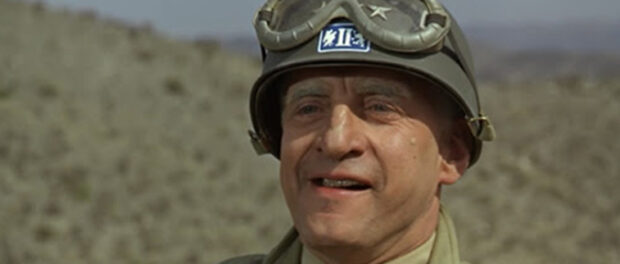Patton (1970)
[5]
George C. Scott’s charisma is the best thing Patton has going for it. The film is a pastiche of the famous (and infamous) army general’s career through World War II, including his successful invasion of Sicily, media blunders resulting in military reprimand, and his eventual aid in the fall of the Third Reich. The film initially paints Patton as a hard-ass who gets the job done — an engaging protagonist for a would-be action movie. But the portrayal gets more complicated as the nearly three-hour film progresses.
Scott’s best scene is one in the middle of the movie, when he tours a tent of wounded soldiers. He talks with a few, and even stops to pray at the bed of a man whose head is completely bandaged. But then Patton comes across a man crying, but seemingly without any physical wounds. When the soldier professes battle fatigue, Scott’s solemn appreciation turns to unadulterated rage. He slaps and berates the soldier, forbidding him from any medical attention and commanding him back to duty. The scene not only demonstrates Scott’s range and considerable screen presence — it’s also a turning point in the general’s story. Once the press reports on his behavior, the military holds him back throughout much of the remaining war effort, including the invasion of D-Day.
Patton gets to return to glory when he’s asked to aid troops trapped at the Battle of the Bulge. Patton talks about glory a few times throughout the movie, in ways that disturb and distance me from both him and the film. He never seems to have the right drive for fighting. By the end of the film, it’s clear that he was a war-monger who was never happier than when he was commanding troops into battle. Characters even wonder what becomes of Patton when there’s not a war for him to participate in.
Patton is a long film that kept my attention while I was watching it — again, primarily due to George C. Scott’s considerable screen presence. But I doubt the movie will stay in my memory. I appreciate the biographical storytelling (co-scripted by Francis Ford Coppola), Jerry Goldsmith’s music, and a supporting performance by Karl Malden. And I’d much rather see a sophisticated depiction of a historical figure than a propagandized one. But Patton’s a selfish asshole, and the film isn’t skeptical or tragic enough to counterbalance that fact.
Academy Awards: Best Picture, Director (Franklin J. Schaffner), Actor (Scott), Screenplay, Art Direction, Sound, Film Editing
Oscar Nominations: Best Cinematography, Visual Effects, Score


